
Washington pushing its own conditions for Armenia–Azerbaijan peace treaty, says Tarasov
Iran views the implementation of the “Zangezur Corridor” project as a Pan-Turanian threat that would not only lead to the economic strengthening of NATO member Turkey, but in the long term could also pose a threat to Iran’s territorial integrity through the use of ethno-separatism, wrote Caucasus expert Stanislav Tarasov in an article published by Svobodnaya Pressa.
According to the expert, Tehran has been, and remains, a categorical opponent of this project due to both the strengthening of the Turkic factor on its northern borders and economic reasons. However, with the reformist Masoud Pezeshkian coming to power, Tehran hopes to soften the West’s position in order to export its gas to Europe.
The fact is that Iran is an important partner for Russia in the North–South intergovernmental corridor project, in which Moscow aims to secure direct transit of goods through Azerbaijan to Iran and India (Asia) with access to the Persian Gulf.
“In the end, it is the United States that is assuming control over both the corridor and the settlement process between Yerevan and Baku. According to a number of experts, Washington is not only seeking to become a mediator in resolving the Armenian–Azerbaijani conflict, but is also putting forward its own conditions for the signing of a peace treaty. Such a prospect directly affects not only the interests of Iran and Russia, but also brings the problems of the South Caucasus into the Middle East,” Tarasov wrote.


